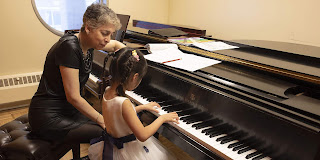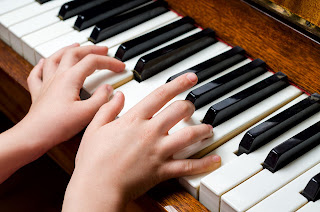Learning to play the piano is a fulfilling and rewarding experience. However, it can be intimidating and overwhelming, especially for beginners. In this guide, we will provide you with a step-by-step approach to learn to play the piano effectively.
Table of Contents
1.Introduction
2.Understanding the Basics of Piano
3.Choosing the Right Piano
4.Finding a Qualified Teacher
5.Learning Piano Online
6.Developing Proper Technique
7.Learning Music Theory
8.Practicing Consistently
9.Setting Goals and Tracking Progress
10.Building Repertoire
11.Playing with Others
12.Overcoming Challenges
13.Staying Motivated
14.Advancing to Higher Levels
15.Conclusion
16.FAQs
1. Introduction
Before starting to learn the piano, it is essential to understand that learning any instrument requires patience, dedication, and practice. Learning the piano is a process that takes time, and it is important not to rush it. With the right guidance, anyone can learn to play the piano and enjoy the beautiful music it produces.
2. Understanding the Basics of Piano
To start learning the piano, it is important to understand the basic components of the piano. The piano is an acoustic instrument that produces sound by striking strings with hammers. The keys on the piano correspond to different notes on the musical scale. The standard piano has 88 keys, 52 white keys, and 36 black keys. Understanding the layout of the piano keyboard is crucial for beginners.
3. Choosing the Right Piano
Choosing the right piano is an important step in the learning process. There are several types of pianos available in the market, including acoustic pianos, digital pianos, and keyboards. Acoustic pianos produce a rich and warm sound, but they are bulky, expensive, and require regular maintenance. Digital pianos and keyboards are portable, affordable, and offer several features that make learning more accessible for beginners.
4. Finding a Qualified Teacher
Finding a qualified piano teacher is essential for learning the piano effectively. A good piano teacher can provide personalized guidance, help develop proper technique, and give feedback on your progress. Look for a teacher who has experience teaching beginners, has a teaching philosophy that aligns with your learning style, and has excellent communication skills.
5. Learning Piano Online
Learning the piano online has become a popular option in recent years. Online piano lessons offer flexibility, affordability, and the opportunity to learn from renowned pianists from around the world. There are several online platforms that offer piano lessons, including Piano Marvel, Playground Sessions, and Simply Piano.
6. Developing Proper Technique
Developing proper technique is crucial for learning the piano effectively. Proper technique involves hand positioning, finger placement, posture, and touch. A qualified piano teacher can help develop proper technique, or online resources such as YouTube tutorials and piano forums can provide guidance.
7. Learning Music Theory
Learning music theory is essential for understanding the principles of music and improving your playing skills. Music theory involves learning the language of music, including notes, scales, chords, and rhythm. A good understanding of music theory can help you read sheet music, compose music, and improvise.
8. Practicing Consistently
Practicing consistently is crucial for learning the piano effectively. Regular practice helps develop muscle memory, improves accuracy, and builds endurance. Set a practice schedule that suits your lifestyle, and aim for at least 30 minutes of practice per day.
9. Setting Goals and Tracking Progress
Setting goals and tracking progress is essential for staying motivated and achieving success in learning the piano. Set realistic goals that align with your skill level.
10. Building Repertoire
Building repertoire is an essential part of learning the piano. Repertoire refers to the collection of pieces that a pianist can play proficiently. Start with simple pieces and gradually progress to more complex ones. Focus on learning pieces that you enjoy playing and that challenge you to improve your skills.
11. Playing with Others
Playing with others is an excellent way to improve your piano skills and gain performance experience. Joining a piano club, playing with friends, or accompanying a vocalist or instrumentalist can help you develop your musicality, timing, and collaboration skills.
12. Overcoming Challenges
Learning the piano can be challenging, and it is essential to overcome the obstacles that arise. Some common challenges include hand coordination, playing at the correct tempo, and memorizing pieces. Patience, persistence, and practice are key to overcoming these challenges.
13. Staying Motivated
Staying motivated is crucial for learning the piano effectively. Set achievable goals, track your progress, and celebrate your successes. Take breaks when needed, and find inspiration from other pianists, performances, and music genres.
14. Advancing to Higher Levels
Advancing to higher levels requires consistent practice, dedication, and a willingness to learn. Take on more complex pieces, explore different music genres, and attend workshops or masterclasses. Consider pursuing piano exams or competitions to challenge yourself and gain recognition for your skills.
15. Conclusion
Learning to play the piano is a rewarding journey that requires patience, dedication, and practice. Whether you choose to learn with a teacher, online, or independently, understanding the basics of the piano, developing proper technique, learning music theory, practicing consistently, setting goals, and building repertoire are crucial for success. Overcoming challenges, staying motivated, and advancing to higher levels are part of the process of becoming a proficient pianist.
16. FAQs
Can I learn to play the piano as an adult?
Yes, anyone can learn to play the piano at any age. It requires patience, dedication, and practice, but it is never too late to start.
Do I need a piano to learn to play?
While having access to a piano or keyboard is ideal, there are alternative options such as using a digital piano or practicing on a piano app.
How long does it take to learn to play the piano?
The length of time it takes to learn to play the piano varies depending on several factors such as practice frequency, natural talent, and the level of proficiency desired. Generally, it takes several months to a few years to become proficient.
Do I need to know how to read sheet music to play the piano?
While knowing how to read sheet music is helpful, it is not necessary to play the piano. There are alternative methods such as learning to play by ear or using piano tabs.
Can I teach myself how to play the piano?
Yes, it is possible to teach yourself how to play the piano using online resources, books, or apps. However, having a qualified teacher can provide personalized guidance and feedback that can enhance your learning experience.

















































